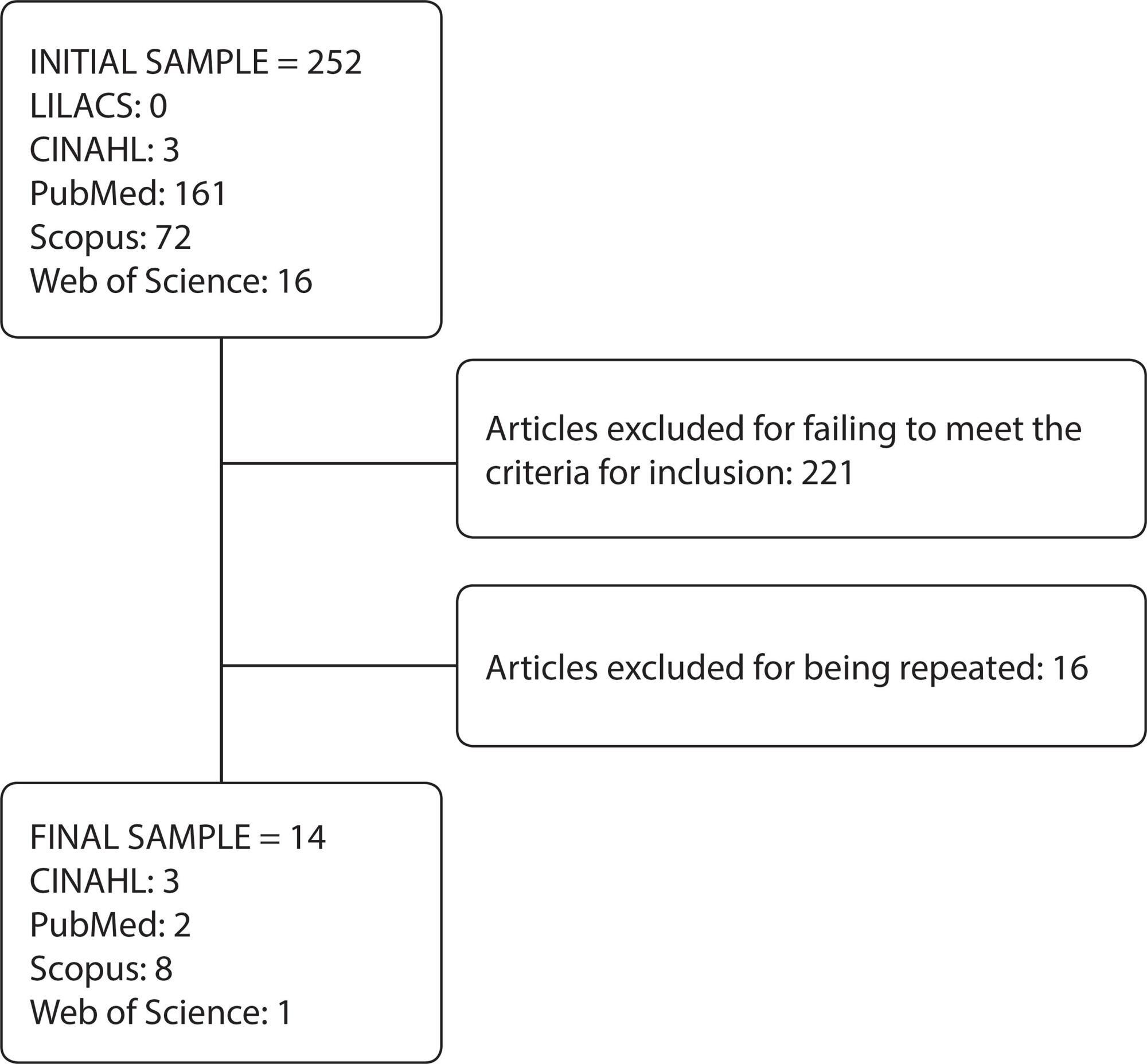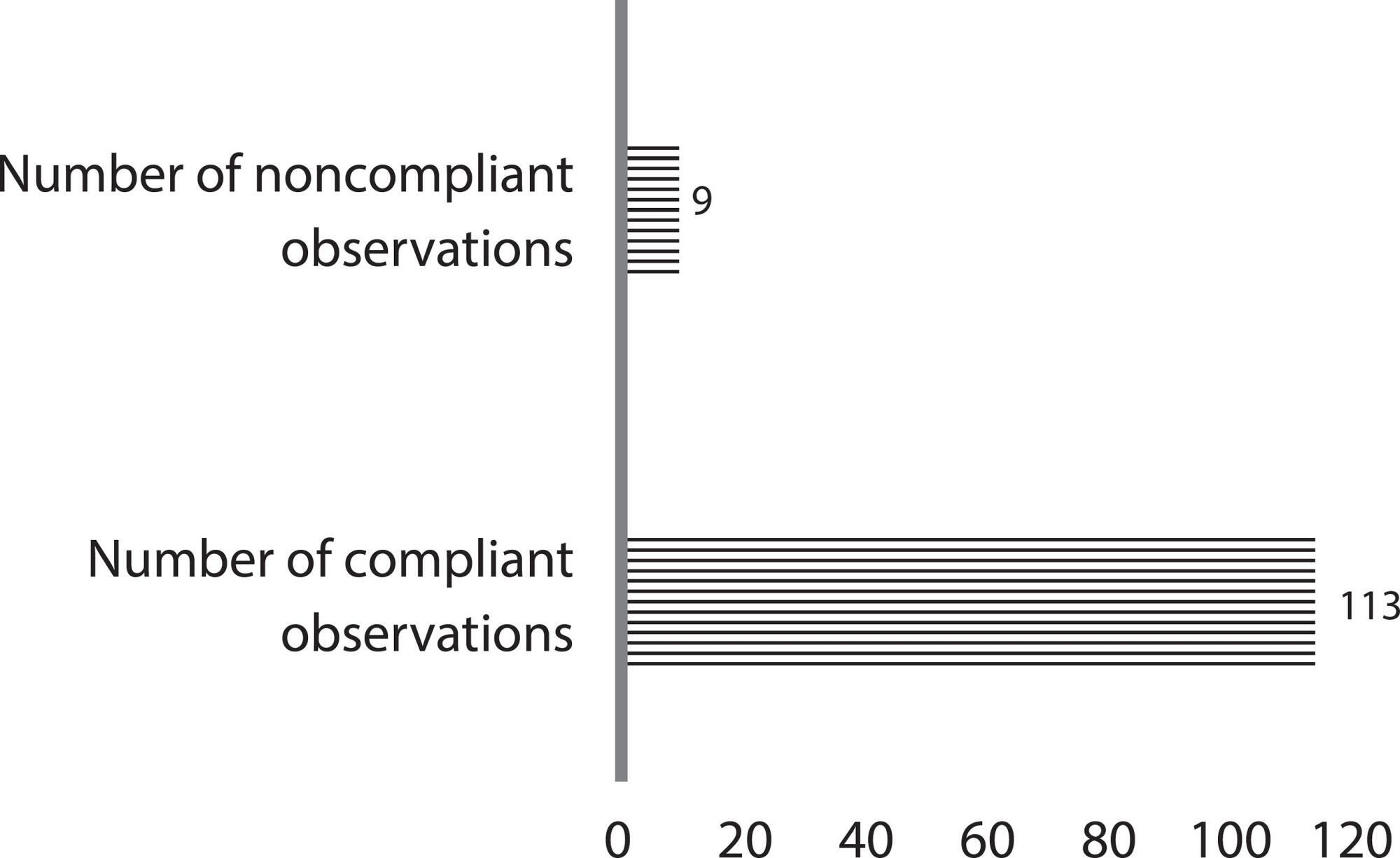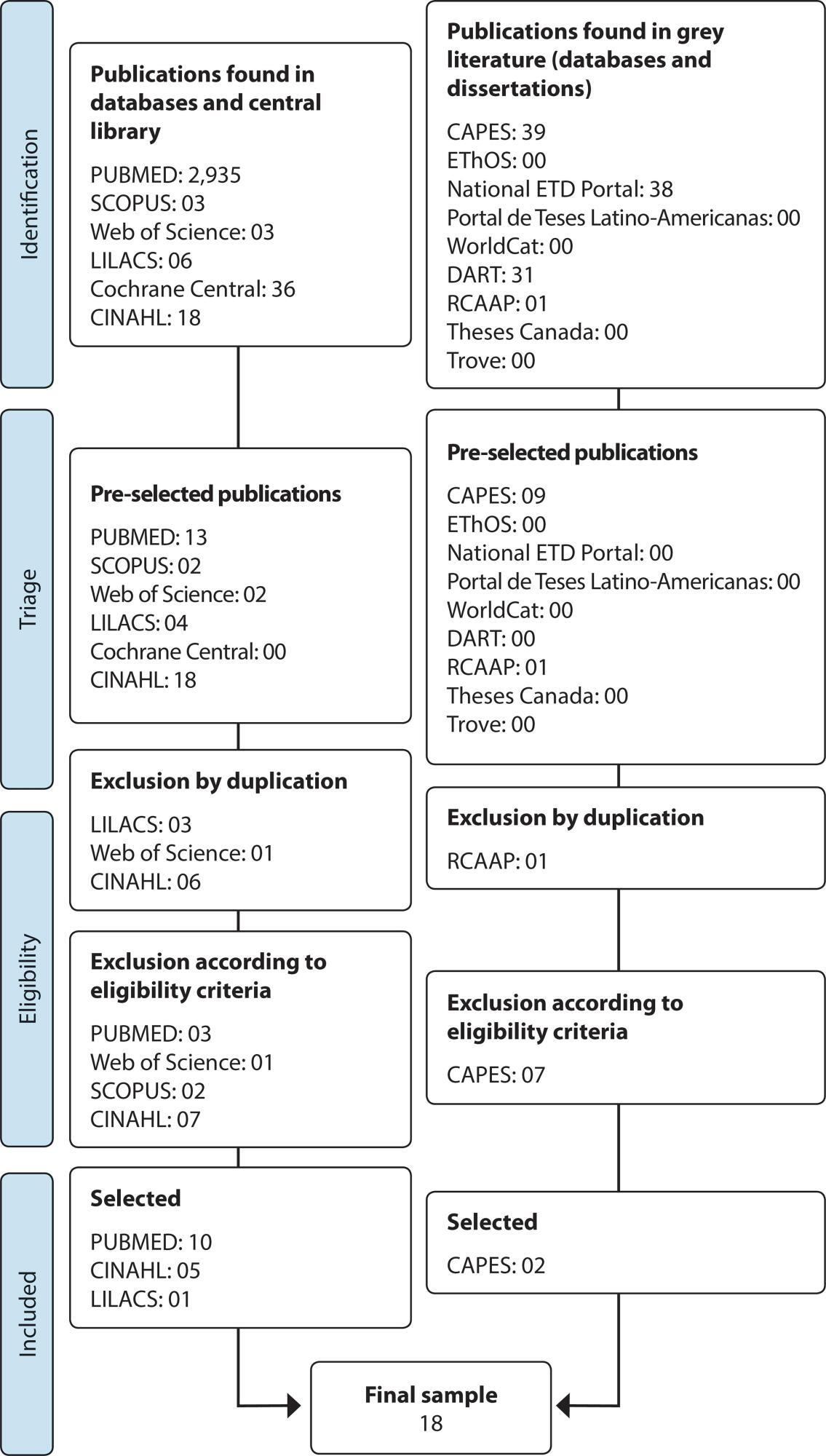-
02-06-2023
The challenge of university teaching in times of the COVID-19 pandemic
Revista Brasileira de Enfermagem. 2023;76(2):e760201
Abstract
The challenge of university teaching in times of the COVID-19 pandemic
Revista Brasileira de Enfermagem. 2023;76(2):e760201
DOI 10.1590/0034-7167.2023760201
Views0This planet’s history has been a long and sometimes tortuous one. To date, a total of five disappearances of life on Earth have been distinguished: the great oxidation; the Ordovician-Silurian extinction; the Devonian extinction; the Permian-Triassic extinction; the Triassic-Jurassic extinction; and the Cretaceous-Tertiary extinction. The causes? Very varied and diverse: anoxia phenomena in the marine […]See more -
EXPERIENCE REPORT02-06-2023
Surgical counting: design of implementation and maintenance of a standardized evidence-based procedure
Revista Brasileira de Enfermagem. 2023;76(1):e20220144
Abstract
EXPERIENCE REPORTSurgical counting: design of implementation and maintenance of a standardized evidence-based procedure
Revista Brasileira de Enfermagem. 2023;76(1):e20220144
DOI 10.1590/0034-7167-2022-0144
Views0See moreABSTRACT
Objectives:
to report the implementation and maintenance of an evidence-based Standard Operating Procedure for surgical counting performed at a teaching hospital.
Methods:
a report of a project to implement evidence for surgical counting, carried out at a university hospital in December 2017, and the subsequent cycles for better performance of the implemented organizational document and maintenance of better results until March 2022.
Results:
the report is divided into implementation project presentation and four other cycles after implementation, related to maintenance of improvements. It was possible to prepare a Standard Operating Procedure for Surgical Count, train the nursing team, carry out educational intervention for surgical teams.
Final Considerations:
there was an improvement in complying with the standardized procedure at the first moment and worsening in the period related to the pandemic. New efforts began again, including a self-instructive online course combined with first-time strategies.
-
REVIEW02-06-2023
Nursing care management concepts: scoping review
Revista Brasileira de Enfermagem. 2023;76(1):e20220020
Abstract
REVIEWNursing care management concepts: scoping review
Revista Brasileira de Enfermagem. 2023;76(1):e20220020
DOI 10.1590/0034-7167-2022-0020
Views0See moreABSTRACT
Objectives:
to clarify the concepts of Nursing Care Management and Nursing Care Administration in the scientific literature, highlighting approximations and distances between the terms.
Methods:
scoping review as per Joanna Briggs Institute protocol and preferred reporting items for Systematic Reviews and Meta-analysis extension for Scoping Reviews (PRISMA-ScR). The searches were performed in LILACS, CINAHL, MEDLINE, and Scopus databases.
Results:
the qualitative analysis, through content analysis, counted 49 studies published between 2007 and 2020. Hospital care was the most evident level of care. It was identified that nursing care management aims at the macropolitical performance of nurses and mobilizes skills essentially strategic-cognitive, while Nursing Care Administration aims at the micropolitical performance of nurses, requiring essentially strategic-administrative skills.
Final Considerations:
the study allowed us to propose the conceptualization of the terms and identify the approximations and distances between them.

-
ORIGINAL ARTICLE02-06-2023
Sexuality and its effects on older adults’ depressive symptoms and quality of life
Revista Brasileira de Enfermagem. 2023;76(1):e20210645
Abstract
ORIGINAL ARTICLESexuality and its effects on older adults’ depressive symptoms and quality of life
Revista Brasileira de Enfermagem. 2023;76(1):e20210645
DOI 10.1590/0034-7167-2021-0645
Views0See moreABSTRACT
Objectives:
to analyze the effects of sexuality on depressive symptoms and quality of life in older adults.
Methods:
a cross-sectional and analytical study, developed with 596 older adults, who completed four instruments for data collection. Data were analyzed using the Kruskal-Wallis test and Structural Equation Modeling, with a 95% Confidence Interval.
Results:
among the sexuality dimensions, only physical and social adversities exerted statistically significant effects on depressive symptoms (SC=-0.095; p=0.003), but with low magnitude. Moreover, all sexuality dimensions had statistically significant effects on quality of life, being of low magnitude for sexual act (SC=0.171; p=0.010) and for physical and social adversities (SC=0.228; p<0.001), and moderate magnitude for affective relationships (SC=0.474; p<0.001).
Conclusions:
effects of different magnitudes were observed between sexuality dimensions on participants’ depressive symptoms and quality of life.

-
ORIGINAL ARTICLE02-06-2023
Internal validity evidence of a knowledge questionnaire on alcohol use, abuse and dependence and associated questions
Revista Brasileira de Enfermagem. 2023;76(1):e20210377
Abstract
ORIGINAL ARTICLEInternal validity evidence of a knowledge questionnaire on alcohol use, abuse and dependence and associated questions
Revista Brasileira de Enfermagem. 2023;76(1):e20210377
DOI 10.1590/0034-7167-2021-0377
Views0See moreABSTRACT
Objectives:
to perform content validity and verify the psychometric properties of the adapted version of an alcohol knowledge questionnaire and associated questions.
Methods:
a methodological study, in which a committee of judges analyzed the questionnaire item representativeness, clarity and relevance. Item response theory was used to assess the instrument psychometric properties applied to a sample of 240 health professionals.
Results:
the questions were adjusted according to judges’ assessment, obtaining a satisfactory Content Validity Index (0.98). High discrimination ability and adequate difficulty levels were observed in 75% of multiple-choice questions and in 25% of statements.
Conclusions:
the instrument presented content validity with satisfactory indices. However, it is recommended that the questionnaire adapted in this study be used in different samples of health professionals from other parts of Brazil, in order to provide greater robustness to its reliability.

-
02-06-2023
COVID-19 Social Thermometer Project: transnational articulations to approach populations in situations of social vulnerability
Revista Brasileira de Enfermagem. 2023;76:e76suppl201
Abstract
COVID-19 Social Thermometer Project: transnational articulations to approach populations in situations of social vulnerability
Revista Brasileira de Enfermagem. 2023;76:e76suppl201
DOI 10.1590/0034-7167.202376suppl201
Views0COVID-19 is an infectious disease that has significantly impacted different contexts around the world, directly and/or indirectly, and on a larger scale in poor and/or developing countries(). We do not know for sure the cumulative effects of COVID-19 on populations (mental disorders, insomnia, anxiety, thrombosis, cognition deficit, memory problems, etc.) after exposure to infection by […]See more -
02-06-2023
Proyecto Termómetro Social COVID-19: articulaciones transnacionales para abordar poblaciones en situación de vulnerabilidad social
Revista Brasileira de Enfermagem. 2023;76:e76suppl201
Abstract
Proyecto Termómetro Social COVID-19: articulaciones transnacionales para abordar poblaciones en situación de vulnerabilidad social
Revista Brasileira de Enfermagem. 2023;76:e76suppl201
DOI 10.1590/0034-7167.202376suppl201es
Views0El COVID-19 es una enfermedad infecciosa que ha impactado significativamente diferentes contextos alrededor del mundo, directa y/o indirectamente, y en mayor escala en países pobres y/o en vías de desarrollo(). No sabemos con certeza los efectos acumulativos del COVID-19 en las poblaciones (trastornos mentales, insomnio, ansiedad, trombosis, déficit cognitivo, problemas de memoria, etc.) tras la […]See more -
EXPERIENCE REPORT02-03-2023
Quality management in the COVID-19 pandemic: nursing action plan
Revista Brasileira de Enfermagem. 2023;76:e20220272
Abstract
EXPERIENCE REPORTQuality management in the COVID-19 pandemic: nursing action plan
Revista Brasileira de Enfermagem. 2023;76:e20220272
DOI 10.1590/0034-7167-2022-0272
Views0See moreABSTRACT
Objectives:
to describe the implementation of a nursing action plan to face the pandemic of COVID 19 in a University Hospital in the state of Rio de Janeiro. Methods: this is an experience report, in which two management tools were used: the Ishikawa Diagram to identify problems and the 5W2H spreadsheet to outline the actions according to the situations presented.
Results:
four categories were listed in two groups: 1- Actions of the Nurse Manager in the Organization of Logistics, Infrastructure and Care: materials and environment; and 2- Nursing Human Resources Management and Continuing Education: method and human resources.
Final Considerations:
the plan developed showed the role of nursing management, with the search for best care practices, development of protocols, carrying out multi-professional training and management of supplies.

-
08-19-2019
Institutional strategies to prevent violence in nursing work: an integrative review
Revista Brasileira de Enfermagem. 2019;72(4):1052-1060
Abstract
Institutional strategies to prevent violence in nursing work: an integrative review
Revista Brasileira de Enfermagem. 2019;72(4):1052-1060
DOI 10.1590/0034-7167-2018-0687
Views0See moreABSTRACT
Objective:
To analyze the production of research that adopted as object of investigation: institutional strategies, actions and programs to curb and/or prevent the nursing workplace violence.
Method:
Integrative review of 14 articles in full, available in the databases LILACS, PubMed Central, Scopus, CINAHL and Web of Science.
Results:
Of the articles analyzed, most arise from quantitative research (71%), carried out in the United States (65%), with educational actions (57%) and programs (43%), denoting policies.
Conclusion:
Results showed various ways to curb or prevent nursing workplace violence. These are specific strategies, there are few programs deployed worldwide, usually centered in the United States, Canada and Sweden. Most of them is well evaluated and can serve as a model for the development and dissemination of policies according to the needs of each location.

-
08-19-2019
Professional education on dementias in Primary Health Care: an integrative review
Revista Brasileira de Enfermagem. 2019;72(4):1086-1093
Abstract
Professional education on dementias in Primary Health Care: an integrative review
Revista Brasileira de Enfermagem. 2019;72(4):1086-1093
DOI 10.1590/0034-7167-2018-0652
Views0See moreABSTRACT
Objective:
To investigate the most commonly used educational approaches in dementia training for primary health care professionals.
Method:
Integrative literature review, conducted between April and June of 2018, in PubMed, LILACS and IBECS databases. The descriptors used were: Training, Health Personnel, Dementia, Primary Health Care for PubMed; and the MeSH terms, Training Programs, Health Personnel, Dementia, and Primary Health Care for LILACS and IBECS.
Results:
The sample consisted of 13 articles; eight were published in the last five years (62%); seven articles with a quantitative approach (54%); seven articles produced on the European continent (54%), followed by five published on the North American continent (38%). All journals were from the health area (100%).
Conclusion:
Educational strategies were combined and used for education. Significant improvements in knowledge, skills, and attitudes of the teams with regard to professional management of dementias were evidenced.

-
ORIGINAL ARTICLE12-05-2019
Factors associated with metabolic syndrome in older adults: a population-based study
Revista Brasileira de Enfermagem. 2019;72:221-228
Abstract
ORIGINAL ARTICLEFactors associated with metabolic syndrome in older adults: a population-based study
Revista Brasileira de Enfermagem. 2019;72:221-228
DOI 10.1590/0034-7167-2018-0620
Views0See moreABSTRACT
Objective:
To estimate the prevalence of the metabolic syndrome and clusters of its components and to identify possible associated factors in older adults.
Method:
Cross-sectional and population-based study, involving 271 older people. We collected sociodemographic, behavioral, clinical, biochemical, and anthropometric data. Data were analyzed by descriptive and logistic regression techniques.
Results:
The prevalence of metabolic syndrome was 59% and was associated with women, overweight/obesity, and the C-reactive protein. Concerning the clusters, 11.4% of the sample had all the components of the metabolic syndrome, and only 5.2% of individuals did not have any of its components.
Conclusion:
We found there is a high prevalence of metabolic syndrome and clusters of its components in older adults. It is important to deepen studies on this matter, considering clinical aspects in relation to sex and healthy behavioral habits for creating public policies as well as emphasizing actions aimed at promoting self-care in all cycles of life.

-
ORIGINAL ARTICLE02-10-2020
Common mental disorders in nursing students of the professionalizing cycle
Revista Brasileira de Enfermagem. 2020;73(1):e20180154
Abstract
ORIGINAL ARTICLECommon mental disorders in nursing students of the professionalizing cycle
Revista Brasileira de Enfermagem. 2020;73(1):e20180154
DOI 10.1590/0034-7167-2018-0154
Views0See moreABSTRACT
Objectives:
to verify the suspicion of common mental disorders in nursing students of the professionalizing cycle and the association with sociodemographic features.
Method:
cross-sectional study with a sample of 85 students from a public university in the state of Rio de Janeiro (RJ) who responded to the Self-Report Questionnaire-20 and sociodemographic questions.
Results:
the suspicion prevalence of common mental disorders (CMD) in the sample was 55.3% and it was identified the association with the consumption of alcohol. Of the most frequent SRQ-20 complaints, 95.3% reported “feeling nervous, tense or worried”, 72.9% “having difficulty making decisions”, 60% “sleeping poorly” and 37.6% “having lost interest by things “.
Conclusion:
high prevalence of CMD in the sample and the association with the consumption of alcohol requires preventive and therapeutic actions among the students that minimize the possibility of severe mental disorders related to the consumption of alcohol and other drugs.
-
REVIEW07-13-2020
Prevention and control measures for neonatal COVID-19 infection: a scoping review
Revista Brasileira de Enfermagem. 2020;73:e20200467
Abstract
REVIEWPrevention and control measures for neonatal COVID-19 infection: a scoping review
Revista Brasileira de Enfermagem. 2020;73:e20200467
DOI 10.1590/0034-7167-2020-0467
Views0See moreABSTRACT
Objective:
to identify with the literature the measures to prevent and control neonatal infection by COVID-19.
Methods:
a scope review carried out by searching for studies in databases and institutional health websites. The final sample was 25 articles.
Results:
among the main measures are the use of masks by suspected or infected people in contact with healthy newborns, hand hygiene before and after each care and feeding as well as the tools used for milking. It is indispensable to use personal protective equipment by health professionals in neonatology services to maintain a private room for infected newborns or to use physical barriers. Early diagnosis and timely case management is essential to reduce virus transmissibility.
Conclusions:
the research contributed to elucidate health and nursing actions in preventing and controlling neonatal infection by COVID-19.

-
ORIGINAL ARTICLE06-27-2019
Insertion of central vascular catheter: adherence to infection prevention bundle
Revista Brasileira de Enfermagem. 2019;72(3):774-779
Abstract
ORIGINAL ARTICLEInsertion of central vascular catheter: adherence to infection prevention bundle
Revista Brasileira de Enfermagem. 2019;72(3):774-779
DOI 10.1590/0034-7167-2018-0124
Views0See moreABSTRACT
Objective:
To evaluate the compliance of the care process involving insertion of central vascular catheter (CVC) in hemodialysis.
Method:
Cross-sectional quantitative approach developed at the hemodialysis service of a reference hospital in Sergipe, Brazil. Sample consisting of 1,342 actions evaluated, corresponding to 122 forms for monitoring and control of CVC insertion. Data collection was held from July to December 2016.
Results:
The adherence rate to the use of the insertion form was 54.9%. The procedure evaluated achieved 93% overall compliance. Of the 11 specific actions observed, seven (64%) presented 100% compliance. The density of the overall incidence of primary bloodstream infections reduced from 10.6 to 3.1 infections per 1,000 patients/day.
Conclusion:
Although the observed actions reached specific desired conformities, the use of the checklist was lower than expected. Strategies for monitoring, coaching and educational and organizational actions can contribute to safe care.

-
REVIEW06-17-2020
Prevention and conduct against the Extravasation of antineoplastic chemotherapy: a scoping review
Revista Brasileira de Enfermagem. 2020;73(4):e20190008
Abstract
REVIEWPrevention and conduct against the Extravasation of antineoplastic chemotherapy: a scoping review
Revista Brasileira de Enfermagem. 2020;73(4):e20190008
DOI 10.1590/0034-7167-2019-0008
Views0See moreABSTRACT
Objectives:
to identify and synthesize scientific evidence on prevention and management of extravasation of antineoplastic agents in adult patients by nurses.
Methods:
scoping review, according to Joanna Briggs Institute and PRISMA-ScR. Research was conducted in five electronic databases, Cochrane Library and eight catalogs of theses and dissertations. Data collection occurred from April to July 2018, with no time limit. The extracted data were analyzed and synthesized in a narrative way.
Results:
a total of 3,110 records were retrieved and 18 studies were kept for review. Most publications (66.6%) had a qualitative approach and addressed both aspects, i.e., prevention and management of extravasation of chemotherapy in adult patients.
Conclusions:
the implementation of protocols based on scientific evidence on prevention and management of extravasation of antineoplastic agents is paramount in order to provide patient safety and support to the nursing staff.

-
ORIGINAL ARTICLE12-05-2019
Functional health literacy in hypertensive elders at primary health care
Revista Brasileira de Enfermagem. 2019;72:266-273
Abstract
ORIGINAL ARTICLEFunctional health literacy in hypertensive elders at primary health care
Revista Brasileira de Enfermagem. 2019;72:266-273
DOI 10.1590/0034-7167-2018-0897
Views0See moreABSTRACT
Objective:
to assess the relationship between inadequate functional health literacy and inadequate blood pressure control in older people with hypertension in Primary Health Care.
Method:
a cross-sectional study with sample calculated at 392. SAHLPA-18 tool was used for functional health literacy; blood pressure was measured; sociodemographic and clinical data were collected. Hierarchical logistic regression was used.
Results:
(high) inadequate blood pressure and (low) functional inadequate health literacy were present in 41.6% and 54.6% of the people, respectively. Factors associated with inadequate blood pressure were: inadequate functional health literacy, black-brown skin color, overweight-obesity, hypertension diagnosis time, non-adherence to exercise/diet, drug treatment. Schooling had no association with inadequate blood pressure
Conclusion:
hypertensive elderly people with inadequate health literacy were more likely to have inadequate blood pressure. Thus, health professionals need to value functional health literacy as a possible component to control blood pressure.
Search
Search in:
Nuvem de Tags
Adolescente (85) Atenção Primária à Saúde (239) COVID-19 (91) Criança (91) Cuidados de Enfermagem (269) Educação em Enfermagem (151) Educação em Saúde (139) Enfermagem (930) Enfermagem Pediátrica (86) Estudantes de Enfermagem (77) Estudos de Validação (131) Família (87) Idoso (208) Promoção da Saúde (99) Qualidade de Vida (104) Saúde do Trabalhador (86) Saúde Mental (145) Saúde Pública (82) Segurança do Paciente (150) Tecnologia Educacional (100)



